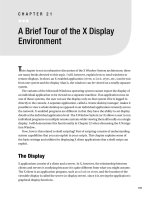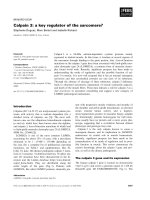4 2 3 a world tour of cultures
Bạn đang xem bản rút gọn của tài liệu. Xem và tải ngay bản đầy đủ của tài liệu tại đây (2.93 MB, 10 trang )
Suggested levels for Guided Reading, DRA,™
Lexile,® and Reading Recovery™ are provided
in the Pearson Scott Foresman Leveling Guide.
Genre
Nonfiction
Expository
nonfiction
Fiction
Comprehension
Skills
Skill and
and Strategy
Strategy
• First
DrawItem
Conclusions
• Second
Generalize
Item
• Answer Questions
A World Tour
of Cultures
Text Features
•
•
•
•
Captions
Item 1
Heads2
Item
Glossary
Item 3
Item 4
Scott Foresman Reading Street 4.2.3
ISBN 0-328-13433-3
ì<(sk$m)=bded f< +^-Ä-U-Ä-U
by Sharon Franklin
Vocabulary
aboard
atlas
awkward
capable
chanted
Reader Response
1. The author writes, “We can tell a lot about a
people by their homes.” Choose some homes
described in the book. Make a chart like the one
below to show what each home tells about the
people who live in it.
A World Tour
of Cultures
Homes
The people who live in these
homes
mechanical
miracle
reseats
vehicle
Word count: 814
Note: The total word count includes words in the running text and headings only.
Numerals and words in chapter titles, captions, labels, diagrams, charts, graphs,
sidebars, and extra features are not included.
2. How do people in some Asian countries protect
themselves from flooding?
3. The word tradition appears often in this book.
Use context clues to define the word tradition.
Then check the definition in a dictionary.
by Sharon Franklin
4. Study the photo of the Masai village on page 7.
What conclusions can you draw about the people’s
lifestyle from seeing the layout of their village?
Write two sentences that you think describe their
way of life.
Editorial Offices: Glenview, Illinois • Parsippany, New Jersey • New York, New York
Sales Offices: Needham, Massachusetts • Duluth, Georgia • Glenview, Illinois
Coppell, Texas • Ontario, California • Mesa, Arizona
Every effort has been made to secure permission and provide appropriate credit for
photographic material. The publisher deeply regrets any omission and pledges to
correct errors called to its attention in subsequent editions.
This family is celebrating Chinese New Year. Sharing
traditions helps tie families together.
Unless otherwise acknowledged, all photographs are the property of Scott Foresman,
a division of Pearson Education.
Photo locators denoted as follows: Top (T), Center (C), Bottom (B), Left (L), Right (R),
Background (Bkgd)
Cover (C) ©Japack Company/Corbis, Cover (L) © Bryan F. Peterson/Corbis, Cover (R)
©Michael S. Yamashita/Corbis; 1 © Leonard de Selva/Corbis; 3 © Dave Bartruff/Corbis;
4 ©Anthony Bannister; Gallo Images/Corbis; 5 (T) © Bryan F. Peterson/Corbis, 6 (TL)
©Michael S. Yamashita/Corbis, 6 (TR) © Jon Spaull/Corbis, 6 (B) © Vince Streano/Corbis;
7 ©Gavriel Jecan/Corbis; 8 © Japack Company/Corbis; 9 (Bkgd) © Seattle Art Museum/
Corbis, 9 (C) ©Richard T. Nowitz/Corbis; 10 © Leonard de Selva/Corbis; 11 © Owen
Franken/Corbis; 12 © SETBOUN/Corbis; 13 © Reza; Webistan/Corbis; 14 © Jonathan Blair/
Corbis; 15 (B) ©Peter Johnson/Corbis, 15 (CL) © Owen Franken/Corbis
ISBN: 0-328-13433-3
Copyright © Pearson Education, Inc.
All Rights Reserved. Printed in China. This publication is protected by Copyright,
and permission should be obtained from the publisher prior to any prohibited
reproduction, storage in a retrieval system, or transmission in any form by any
means, electronic, mechanical, photocopying, recording, or likewise. For information
regarding permission(s), write to: Permissions Department, Scott Foresman, 1900 East
Lake Avenue, Glenview, Illinois 60025.
4 5 6 7 8 9 10 V0H3 14 13 12 11 10 09 08 07 06
The Call of Culture
What ties people together even when they are
far apart? The answer is culture—the traditions
and practices that people share. Culture includes
language, food, songs, art, and clothing.
Let’s visit Africa, Asia, and Europe. Can you
find these continents in an atlas? Let’s pack our
bags and begin this cultural journey.
3
Talk and Culture
Language is a vehicle people use to pass down
stories and traditions. In some cultures there is an
oral tradition. A storyteller rises to tell and act out
one of the old stories and then reseats himself or
herself in the group. In this way, stories and songs
are passed from one generation to another.
Africa has more than eight hundred languages.
They all started from a single language. Some
have died out because there is no one left who is
capable of reading or writing them.
Bush people listen to a
story, an important part of
their culture and learning.
King Ludwig’s castle, Neuschwanstein.
Home, Sweet Home
We can tell a lot about a people by their
homes. The earliest people in Europe probably
lived in caves. Wealthy kings and queens often
lived in castles.
Today, most people live in apartments
or houses. In the crowded European city of
Amsterdam, though, people also live aboard
houseboats along the canals.
4
5
Houses on stilts
A yurt
From Stilts to Junks to Yurts
Some houses in the Asian countries of Laos,
Thailand, and Indonesia are perched on high,
awkward-looking poles called stilts. These protect
the houses from floods. In the crowded Hong
Kong region of China, many families live on
sturdy boats called junks.
Some people in Mongolia, in east-central Asia,
don’t live in one place. They travel with their
cattle and carry their round tent houses—called
yurts—with them.
Herds of cattle are led in and out
of a Masai village in Kenya.
A Hong Kong houseboat
Brothers for Life
The Masai people of Africa make their homes
in village communities in Kenya, in east Africa. As
many as five related families live in one house.
The boys from these families are grouped by age.
Their close relationship is like that of brothers.
They remain part of this group for life.
6
7
A Japanese woman wearing a kimono
A Masai guide wearing beaded necklaces
What Are You Wearing, and Why?
Traditional clothing is another way that people
keep their cultures alive.
In Scotland, tartans, or plaids, show a person’s
rank. A clan, or family, adopts its own special
plaid. The more colors in the cloth, some say, the
higher the position.
In the past, everyone in Japan wore kimonos.
Kimonos are long gowns with wide sleeves. The
wealthier you were, the more beautiful your
kimono. Even today, handmade kimonos are
worn for special occasions.
8
The Culture of Colors
African countries are known for their brightly
colored fabrics. Ghana is famous for its handwoven kente cloth. The patterns in Masai
beadwork let people know whether a woman is
married or unmarried.
The colors used in traditional African clothing
often have special meanings. For example, some
Masai say the color green stands for peace.
9
Say It with Paper!
Paper was invented in China about A.D. 105.
At first, it was made from bamboo, hemp, or
mulberry plants. Only the rich could afford it. It
took another 800 years before all Chinese could
afford paper.
Paper is an important part of Chinese culture.
During the spring New Year Festival in central
China, people hang red paper cuttings to
decorate their homes. This is thought to bring
good luck.
The traditional art of Chinese
papercutting takes years to master.
A candlemaker hangs a rack of hand-dipped candles to
dry in his workshop in France.
The Beauty of Art
Art can capture our imaginations in many
ways. A pyramid in Egypt looks like a miracle.
Objects in a museum can show us how life was
lived thousands of years ago.
Not all art is made to last through the ages.
This candlemaker’s amazing wax creations will
soon burn away.
10
11
A Sami shaman holding
a ceremonial drum
Magic Drums
Lapland is an area north of the Arctic Circle
that includes part of Norway, Sweden, Finland,
and Russia. For nine months of every year, the
area is frozen and white with snow. But the Sami
of Lapland paint the sun on their drums!
Historically, Sami drums were not just used
to provide a mechanical rhythm. They played a
spiritual part as well. Sami priests used drums
when they talked to spirits and chanted their
prayers.
Yugur people, a Muslim
minority in China
12
13
Our Mix of Cultures
Our cultural heritage is everywhere. It is found
in our clothing. It is mixed into our food. It is
communicated by our language.
When groups of people live close together, it
is easier to keep traditions alive. Then a tradition
can repeat itself, generation after generation.
By honoring the traditions of our ancestors,
we can be a part of something that has lasted for
many years. What cultural traditions might you
pass on?
Why would a bride
tuck a lump of sugar
into her glove during
a Greek wedding?
Answer: To have a
sweet life!
Frying potato pancakes
A breakfast of tomatoes
and sausages cooks on a
grill in South Africa.
Delicious Traditions
Every culture has its own food traditions. For
example, a typical Korean food is kimch’i, a spicy
cabbage dish. Kimch’i is served at every meal,
along with rice.
Jewish families celebrate the holiday of
Hanukkah with latkes. They are pancakes made
from potatoes that are shredded and fried
in oil. A Braai is the South African version of
a barbecue. Braai is a popular and delicious
tradition.
14
15
Glossary
Vocabulary
Reader Response
aboard
aboard
adv. on a ship,
plane, bus, etc.
mechanical adj. like a
machine; automatic.
atlas n. book of maps.
miracle n. wonder.
awkward
adj. not
awkward
graceful in shape;
clumsy.
capable
reseats v. sits back
down again.
atlas
capable adj. skilled,
chanted
competent.
chanted v. said over and
mechanical
over
again.
vehicle n. means by
which something is
communicated, shown,
or done.
1. The author writes, “We can tell a lot about a
people by their homes.” Choose some homes
described in the book. Make a chart like the one
below to show what each home tells about the
people who live in it.
Homes
The people who live in these
homes
miracle
reseats
vehicle
Word count: 814
Note: The total word count includes words in the running text and headings only.
Numerals and words in chapter titles, captions, labels, diagrams, charts, graphs,
sidebars, and extra features are not included.
16
2. How do people in some Asian countries protect
themselves from flooding?
3. The word tradition appears often in this book.
Use context clues to define the word tradition.
Then check the definition in a dictionary.
4. Study the photo of the Masai village on page 7.
What conclusions can you draw about the people’s
lifestyle from seeing the layout of their village?
Write two sentences that you think describe their
way of life.









